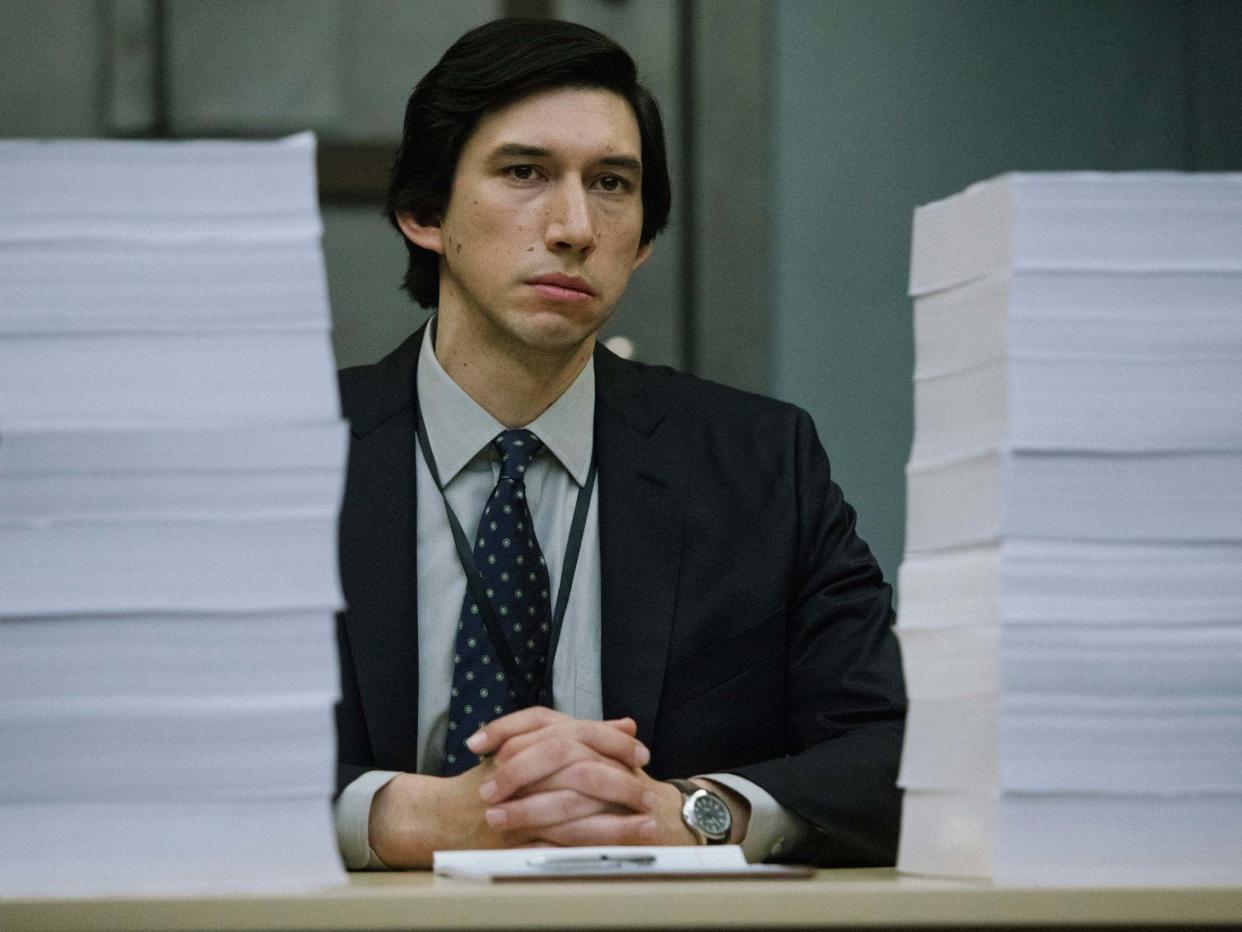The Report review: An unvarnished, honest account of CIA torture tactics

Dir: Scott Z Burns. Starring: Adam Driver, Annette Bening, Ted Levine, Michael C Hall, Tim Blake Nelson, Corey Stoll, Maura Tierney and Jon Hamm. 15 cert, 119 mins
In 2009, Senate staffer Daniel J Jones, an employee of California senator Dianne Feinstein, was put in charge of the bipartisan investigation into the CIA’s use of torture post-9/11. He and his team spent the next three years sifting through the CIA’s documents, memos, and emails in search of concrete answers. The resulting 7,000-page report proved unequivocally that the CIA’s so-called enhanced interrogation techniques were not only barbaric and immoral, but utterly ineffective.
The Report dramatises the struggle to bring these abuses to light. Adam Driver plays Jones, Annette Bening Senator Feinstein, and director Scott Z Burns captures the events in a cold, rigorously factual, and largely dispassionate manner. But that’s the point. The Report chooses to value the truth over bombastic displays of morality. In the film, when Jones is initially approached about compiling the report, he’s warned to keep his personal feelings at bay. That, he’s told, is the first thing the Republicans look for. Any hint of compassion makes you an automatic target. In fact, The Report’s few bursts of sentimentality are also its weakest points. We’re first introduced to Jones as he cradles a miniature White House snow globe, acquired as a good luck charm for a big job interview. It’s symbolically discarded a scene later, after his dreams of DC have been firmly dashed. Yet Burns’s script is largely concerned with the who, what, and wheres of the situation. He seeks to present them in a sober and straightforward manner – in antithesis to the zippy energy of his frequent collaborator, Steven Soderbergh.
When the real-life Jones and Feinstein attempted to get the report published in 2012, the CIA unsurprisingly closed ranks. It did everything in its power to suppress the report. It lied to the American public, preying on the country’s crippling fear that another attack would strike its shores. In its carefully crafted reality, torture was the only sure way to prevent another 9/11 (the film even takes a jab at Zero Dark Thirty for amplifying this myth). The Report not only confronts the CIA’s vicious attempts at self-preservation, but it also levies criticism at the Obama administration. It shows that the president’s fixation on bipartisanship made him unwilling to back the report in case it ruffled too many feathers in the Republican Party. The entire film is driven by a quiet sense of exasperation. With no outlet for their righteous anger, Jones and Feinstein can only react to these outrageous evasions of justice in the most minute of ways – a clenched jaw here, an unblinking stare there.
There’s a natural tension to Driver’s speaking voice that makes him an ideal choice for the role; it’s largely monotone outside of the occasional, erratic blip. He often seems like he’s sitting on some unspoken sentiment, regularly giving it a kick in the ribs in case it tries to come slithering to the surface. Bening also excels here; hers is the performance of a true stateswoman. She has a superhuman composure even when she’s faced with the most outrageous displays of greed and incompetence. In fact, there’s something unpleasantly prescient about how willing the CIA was to adopt torture tactics proposed by psychologists with no experience in the field and only a handful of flashy buzzwords.
Burns trusts in the talents of his actors and in the worthiness of his script’s subject. It’s an almost deliberately ugly-looking film: the CIA offices are shot with the icy-cold glare of fluorescent lights, while any flashbacks to the torture sites are a sickly yellow-green. The Report actively rejects any hint of glamorisation. Otherwise, perhaps, it would undermine what Jones and his team were fighting for.

 Yahoo Movies
Yahoo Movies 
